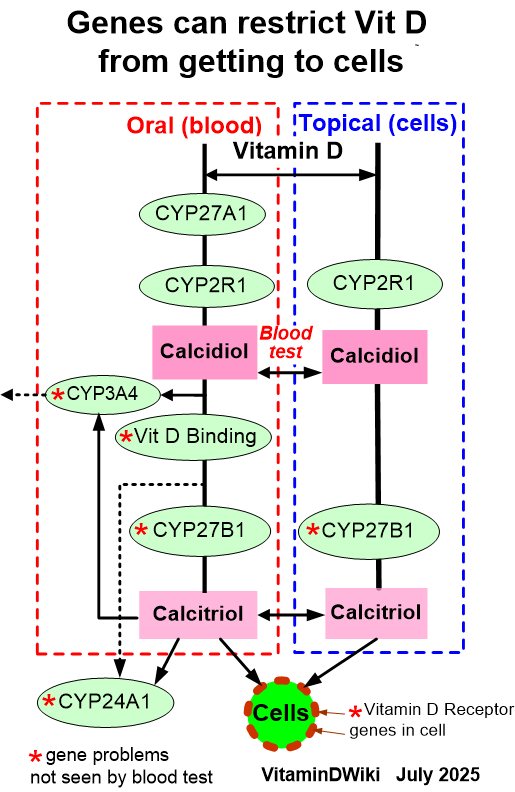2 X better survival of digestive cancer if 2,000 IU of Vitamin D plus good VDBP gene – RCT
Effect of Vitamin D Supplementation on Survival of Digestive Tract Cancer Patients with Low Bioavailable 25-Hydroxyvitamin D levels: A Post Hoc Analysis of the AMATERASU Randomized Clinical Trial
Cancers 2020, 12(2), 347; https://doi.org/10.3390/cancers12020347 (registering DOI)
 click on chart for detials
---
* Prostate cancer 3X more likely to be lethal if both low vitamin D and poor Vitamin D Binding gene – March 2020
* Vitamin D Binding Protein masks how much Vitamin D gets to tissues – May 2019
* Poor Vitamin D response 4X more likely if poor Vitamin D binding proteins - July 2019
* 10 reasons for poor response to Vitamin D (race, binding protein, etc.) – Nov 2017
* Colorectal cancer is associated with Vitamin D (17 meta-analyses so far) – July 2018
* Kidney Cancer 4X more likely if poor Vitamin D Binding Protein (5X in previous study) – Oct 2019
* Increased risk of various cancers if poor vitamin D genes (Binding Protein and CYP27B1) - Sept 2019
click on chart for detials
---
* Prostate cancer 3X more likely to be lethal if both low vitamin D and poor Vitamin D Binding gene – March 2020
* Vitamin D Binding Protein masks how much Vitamin D gets to tissues – May 2019
* Poor Vitamin D response 4X more likely if poor Vitamin D binding proteins - July 2019
* 10 reasons for poor response to Vitamin D (race, binding protein, etc.) – Nov 2017
* Colorectal cancer is associated with Vitamin D (17 meta-analyses so far) – July 2018
* Kidney Cancer 4X more likely if poor Vitamin D Binding Protein (5X in previous study) – Oct 2019
* Increased risk of various cancers if poor vitamin D genes (Binding Protein and CYP27B1) - Sept 2019
📄 Download the PDF from VitaminDWiki


Mitsuyoshi Urashima 1,*,Mai Okuyama 1,Taisuke Akutsu 1,Hironori Ohdaira 2,Mutsumi Kaji 2 and Yutaka Suzuki 2
1 Division of Molecular Epidemiology, Jikei University School of Medicine, 3-25-8, Nishi-Shimbashi, Minato-Ku, Tokyo 105-8461, Japan
2 Department of Surgery, International University of Health and Welfare Hospital, 537-3 Iguchi, Nasushiobara, Tochigi 329-2763, Japan
Vitamin D has been shown to suppress the growth of cancer cells. Cancer cells are believed to take up bioavailable 25-hydroxyvitamin D (25[OH]D) (i.e., not bound to vitamin-D-binding protein (DBP)) more efficiently than DBP-bound 25(OH)D. Our aim was to use this bioavailable 25(OH)D, rather than total 25(OH)D, as a biomarker of vitamin D deficiency to investigate whether vitamin D supplementation improves the relapse-free survival (RFS) of patients with digestive tract cancer from the esophagus to the rectum by conducting a post hoc analysis of the AMATERASU trial (UMIN000001977). The bioavailable 25(OH)D levels were calculated via an equation using data of serum total 25(OH)D, albumin, and DBP levels, and DBP genotypes (rs7041 and rs4588). We estimated bioavailable 25(OH) levels in 355 patients.
In a subgroup of patients with low bioavailable 25(OH)D levels (
